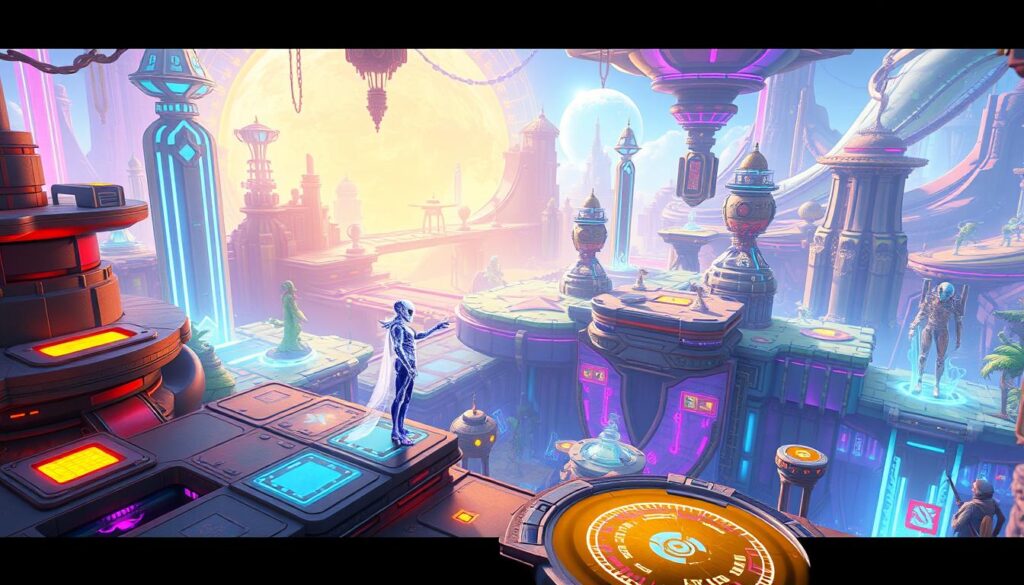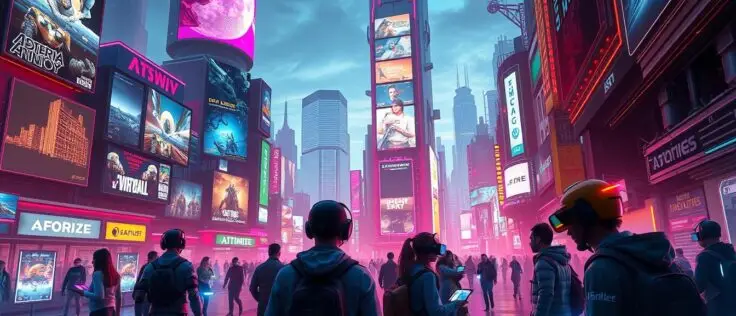The gaming world is changing fast, and AI is playing a big part in this. Experts say that for every $1 spent on new AI in gaming, returns can be as high as $3.501. This shows a bright future for AI in this field. We’re seeing just the start of what AI can do in gaming.
Let’s find out more about how AI is shaping the future of gaming. Discover the impact of AI on creating games and improving the gaming experience3. Read more here.
AI in Gaming: A New Era of Interactive Entertainment
AI is changing the gaming world, making stories more interactive and game AI smarter. These changes make games more fun and show how well technology and entertainment can mix.
Advancements in NPCs and Interactive Environments
NPCs in games are now more realistic thanks to advanced AI. They can respond in real ways to what players do, making the game’s story richer. This makes players more involved in the game.
AI also helps customise the game for each player by learning what they like. This makes the game more personal and immersive for everyone4.
Enhanced Player Experiences Through Real-Time Adaptation
An AI ‘director’ can change a game’s difficulty to match a player’s skills. This keeps the game challenging but fair, making players more likely to keep playing. The AI also changes the story based on decisions players make. This makes every playthrough unique.
To learn about AI in other areas, check out this article. It talks about AI in content marketing and new digital trends.
Procedural Generation: Crafting Infinite Worlds with AI
AI in procedural generation is changing game development. It creates huge, endless worlds with real, detailed surroundings. By using AI, every game feels new as the technology crafts landscapes, weather, and living interactions like never before5. This lets game developers pay more attention to design and how to keep players coming back, improving game quality.
It also makes it easier to create complex in-game items like textures and objects. These are crucial for making games feel real and run smoothly. This technology makes virtual worlds more believable and interactive, reacting in real-time to what players do6. AI cuts down on repeating the same designing tasks, giving creators more time for original ideas and stories.
In virtual reality, procedural generation does more than make things look good. It also simulates real-life physics, making everything in the VR space act as it should. This makes the virtual world feel more real and exciting for the player5. The tech also adjusts games to fit each player’s actions and styles, making experiences more personal and enjoyable7.
NPC Behavior Revolutionised by Artificial Intelligence
The gaming world is changing fast as artificial intelligence (AI) brings new life to NPC (Non-Player Character) behaviour. These changes make games feel more real and emotional. Thanks to AI, NPCs can now learn from and react differently to how players act, making games more immersive.
With the help of deep learning, NPCs can show a wide range of emotions based on what players do. This makes the stories in games deeper and more engaging. A whopping 99% of gamers think AI-enhanced NPCs make games better8. This shows that gamers are looking forward to richer and more responsive gaming worlds.
Dynamic Emotional Responses and In-Game Relationships
Game AI is now more advanced, moving beyond simple scripts to AI that feels alive. Games like “Red Dead Redemption 2” have NPCs that remember past interactions. This creates a world that reacts and changes with the player9.
Authentic Character Development and Quest Alterations
Now, NPCs can grow and change based on how you play. This means players get more challenging and diverse experiences. In fact, 81% of gamers say they’d spend more on games with this kind of NPC intelligence8.
This mix of emotional depth, advanced NPC behaviour, and interactive storytelling is thanks to AI. It doesn’t just draw players in; it promises an ever-evolving gaming experience. As AI grows, the line between player and NPCs fades, creating a game world that is truly interactive and emotionally rich.
Streamlining Game Development with AI-Driven Tools
The world of game development is changing fast, all thanks to AI tools. These tools make work faster and let developers get creative. The gaming market might hit $664 billion by 2033. This makes AI’s role super important11.
Automating Asset Creation and World Building
Efficient Game Testing and Balancing
AI tools are making game testing and balancing much better. They test games like humans would, finding and fixing problems quickly. This ensures players have a good time. These tools also make testing faster and improve game design with data11. Plus, they learn from players to make games more enjoyable12.
In the end, AI tools are changing game development in many ways. They’re making games better and easier to make. As AI grows, it will bring new kinds of games and make gaming more fun and realistic11.
Adaptive Difficulty: Tailoring the Challenge to the Player
Game AI has come a long way. It now boosts player experience by adjusting to their skills. These smart AI systems watch how you play. They make sure the game is just right for you13. The game changes to keep it fair and fun. This way, players don’t get bored or frustrated with the game’s challenges13.
Adaptive AI systems make games more accessible. They match the game pace to your skill, welcoming more players. This approach helps newcomers learn without getting upset by too-hard tasks13.
Personalising Player Experience with AI Insights
AI technology is changing the game world by improving storytelling and player experience. It analyses player data to make games more personal, like how smart assistants learn from users1617. This means games can change based on what players do. They offer challenges and rewards that feel special to each player.
AI helps make games that better satisfy players by using real-time data. It predicts and reacts to what players need right away. This makes games more fun and keeps players interested17.
As AI grows, it’s not just making games look better. It’s transforming how we play and experience games. AI is key to making games that are not only fun but also truly personal. It’s leading the way in making games more interactive and real.
Virtual Reality and AI: The Frontier of Immersive Gaming
The blend of virtual reality and artificial intelligence is reshaping immersive gaming. It combines real-time graphics with interactive stories for unique experiences. This mix boosts how much players enjoy the game and changes how stories are told in digital worlds.
VR and AI mimic complex real-world laws of physics, letting creators build worlds that change with player actions. The realness of these worlds comes from AI’s skill in analysing and mirroring real physics. This makes games feel more real and fun18. AI also plays a key role in making lifelike characters and flexible gameplay, crucial for today’s immersive gaming18.
Simulating Real-World Physics for Greater Immersion
In immersive gaming, AI enhances how virtual spaces interact with players. It does this through smart rendering, so everything in the game reacts instantly to players. By improving graphics within VR, it not only makes the game run smoother but also looks much better. This pushes immersive gaming to new heights18.
Interactive Storytelling in Virtual Spaces
AI deeply affects storytelling in VR. It crafts characters that react in detailed ways to players, giving the game more depth. These AI-created stories make players more involved, as their choices directly influence the story. By joining AI with VR, it creates a space for complex stories that adapt to the player’s actions19.
To see how AI is changing gaming and other areas with immersive experiences and tailored interactions, check out technology and innovation. It shows how AI uses data and learning to make experiences more personal, helping to keep users engaged.
Game AI: More Than Just a Challenge – A Companion and Guide
Game AI has grown from simple codes to beings that shape how we play. It has made gaming more than just winning; it’s about the adventure with AI friends and foes alike. Nowadays, they offer both a challenge and companionship that change with each game.
Intelligent AI Opponents for a Realistic Gaming Experience
Thanks to tech like machine learning, game AI can now learn from your moves. A study found that 69% of gamers love the idea of AI companions20. These smart opponents push players to improve and turn gaming into a richer experience. Because of this, 81% of gamers don’t mind paying extra for games with advanced AI20.
Guiding Player Interaction to Enhance Story Arcs

Game AI is changing the rules by growing with your decisions. It means every game plays out differently, tailored to you. As AI gets smarter, it’s hard to see where the player ends and the AI begins. Soon, AI might wear many hats: enemy, friend, and mentor all in one.
Real-Time Rendering: The Visual Revolution Brought by AI
Game development has changed a lot with AI, especially in real-time rendering. AI helps create graphics that look almost real. Thanks to tech like Nvidia’s GauGAN, developers can make amazing graphics that look like real landscapes. This is a big deal because graphics used to not look this good. Now, over 270 games and apps use DLSS 3 technology21.
The gaming world is loving the improvements in performance and picture quality. For example, Cyberpunk 2077 will use DLSS 3 for better graphics with Ray Tracing: Overdrive Mode21. AI and real-time rendering work together to make games more immersive. Unreal Engine 5.2 and AI plug-ins will make future games even better21.
AI is not just changing games but all entertainment. AI made actors look younger in “The Irishman”, created Thanos in “Avengers: Endgame”, and helped make “The Mandalorian”22. These changes show how important AI is in creating new and better ways to tell stories and make art.
FAQ
How is AI changing the game development process?
AI is making game creation easier by doing jobs like making assets and building worlds. This lets developers use more time on creativity and design. AI also makes testing and game performance better for players.
What impact does AI have on NPC behavior and interactive environments?
AI makes NPCs act more real, with changing emotions and relationships. It also changes environments based on what players do. This makes stories more personal and non-linear.
How does procedural generation powered by AI benefit gamers and developers?
AI helps create endless worlds quickly, saving time and resources. Gamers get new experiences each time, while developers can make better virtual realities and rendering.
What are the advantages of AI in creating authentic character development and quest alterations?
NPCs can change based on how players interact with them, thanks to AI. It makes stories and events in games more personal and real, improving the gaming experience.
How do AI-driven tools streamline game development?
AI speeds up making assets and landscapes. It also helps test and balance games better. These tools let developers make better games faster.
What is adaptive difficulty in gaming and how does AI implement it?
Adaptive difficulty changes the game’s challenge based on how well the player is doing. AI keeps track of the player’s skill to keep the game interesting without making it too hard or easy.
How does AI utilise player insights to personalise experiences?
AI uses what it knows about how players play to make games more tailored. It changes stories, challenges, and rewards to fit the player’s style. This makes the game feel more personal and fun.
In what ways does AI enhance virtual reality gaming?
AI makes VR gaming feel more real with better physics and animations. It makes stories where choices matter, making players more involved and making virtual worlds feel real.
How does AI serve as both a challenge and a guide in gaming?
AI gives players smart opponents that learn and challenge them. It also helps shape the game’s story and outcomes based on choices, making the game more interesting.
What role does AI play in real-time rendering and visual fidelity in games?
AI is key in creating realistic graphics and environments in games. Using tools like Nvidia’s GauGAN, it makes detailed and visually stunning worlds.
Source Links
- Author Post: The Gaming Industry’s Edge in the Artificial Intelligence Revolution – https://www.forbes.com/sites/forbesbooksauthors/2024/03/27/the-gaming-industrys-edge-in-the-artificial-intelligence-revolution/
- How Will Generative AI Change the Video Game Industry? – https://www.bain.com/insights/how-will-generative-ai-change-the-video-game-industry/
- AI in Gaming: Exploring the Impact of Artificial Intelligence – https://www.solulab.com/ai-in-gaming/
- AI in Gaming: Ushering in a New Era of Interactive Entertainment – https://www.linkedin.com/pulse/ai-gaming-ushering-new-era-interactive-entertainment-asthana-jrpde
- Infinite Possibilities: How AI-Driven Procedural Generation is Revolutionizing Gaming 🚀 – https://www.linkedin.com/pulse/infinite-possibilities-how-ai-driven-procedural-gaming-ayah-eliyan-f42fe
- How AI Is Making Video Games More Immersive | Microsoft Edge – https://www.microsoft.com/en-us/edge/learning-center/ai-making-video-games-fun-immersive?form=MA13I2
- The Evolution of AI in Gaming-From NPCs to Procedural Generation – https://medium.com/@RocketMeUpAI/the-evolution-of-ai-in-gaming-from-npcs-to-procedural-generation-d96ebad8d4e6
- AI NPCs and the future of gaming – https://inworld.ai/blog/ai-npcs-and-the-future-of-video-games
- AI in Game Design: How AI is Making Smarter NPCs – https://ejaw.net/ai-in-game-design-how-artificial-intelligence-is-creating-smarter-npcs/
- Evolution of NPCs in Gaming: AI Impact – Whimsy Games – https://whimsygames.co/blog/evolution-of-npcs-in-gaming-ai-impact/
- AI in Game Development: Unleashing Creativity and Streamlining Production – https://www.ailabs.global/blog/ai-in-game-development-unleashing-creativity-and-streamlining-production
- The Impact of AI on Game Development – https://unitydevelopers.co.uk/the-impact-of-ai-on-game-development/
- AI in Game Difficulty Adjustment: Adapting Challenges to Player Skill Levels – https://fintelics.medium.com/ai-in-game-difficulty-adjustment-adapting-challenges-to-player-skill-levels-b7f7767c96b
- Dynamic Difficulty: Exploring Adaptive AI in Video Games – https://blog.acer.com/en/discussion/1594/dynamic-difficulty-exploring-adaptive-ai-in-video-games
- AI in Gaming: Enhancing Player Experience and Virtual Worlds – https://scottamyx.com/2023/06/02/ai-in-gaming-enhancing-player-experience-and-virtual-worlds/
- AI Personalized Gaming: Adapting to Individual Preferences – Whimsy Games – https://whimsygames.co/blog/ai-personalized-gaming-adapting-to-individual-preferences/
- How AI is Revolutionizing Game Design and Player Experiences – https://www.linkedin.com/pulse/how-ai-revolutionizing-game-design-player-experiences-pithadiya-a9wff
- AI and Virtual Reality Integration in Gaming Experiences – Whimsy Games – https://whimsygames.co/blog/ai-and-virtual-reality-integration-in-gaming-experiences/
- Virtual Reality Meets AI: A New Frontier in Gaming – https://coggleme.com/community/virtual-reality-meets-ai-a-new-frontier-in-gaming
- The case for adding AI companions to video games – https://inworld.ai/blog/ai-sidekicks-and-ai-companions-in-video-games
- A Revolution Rendered in Real Time: NVIDIA Accelerates Neural Graphics at GDC – https://blogs.nvidia.com/blog/neural-graphics-gdc/
- The Growing Role of AI in Visual Effects Creation | Synapse Studio – https://synapsestudiovn.com/the-growing-role-of-ai-in-visual-effects-creation/






